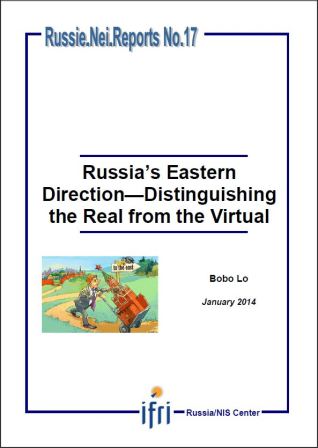Russia's Eastern Direction - Distinguishing the Real from the Virtual

The Asia-Pacific region has assumed primary importance as a center of global politics and economic dynamism. For Moscow, this development highlights a world in which many long-standing assumptions about international politics are being overturned. It speaks of “global power … shifting to the East,” and of Russia becoming involved in the “dynamic integration processes in the ‘new Asia".” But for all the rhetoric about a “turn to the East”, Russia’s commitment to serious engagement with the Asia-Pacific is uncertain. Its elite retains a strongly Western-centric world-view, even as it criticizes Western shortcomings.
Although Moscow has begun to appreciate Asia as important in and of itself, it is mainly concerned to assert Russia as an “independent” Eurasian center of power within the “polycentric system of international relations”. Cooperation with Asian countries is the means to a larger end rather than the end itself. The outcome of these contradictions is predictably mixed. On the one hand, Moscow is investing greater effort into the Asia-Pacific—a focus heightened by the critical importance of the “strategic partnership” with China, the vulnerability of the Russian Far East, and the need to diversify energy exports. On the other hand, Russia remains a peripheral actor in the region—a country that may be in Asia, but is far from being of Asia. The Kremlin’s tendency to see international relations primarily in terms of Great Power relations means, in particular, that it does not have an Asia policy so much as a policy toward the major Asian powers, above all China. Over the next decade, Putin will continue to prioritize the relationship with Beijing, and Russia’s China-dependence will increase despite efforts to diversify ties with Japan, Vietnam, and India. Economic engagement will be dominated by energy exports, although Russia will be a niche rather than primary supplier of Asian requirements. More generally, the Asia-Pacific will remain a secondary “vector” for Moscow, and the vision of Russia as a “Euro-Pacific power” aspirational at best.

Available in:
Regions and themes
ISBN / ISSN
Share
Download the full analysis
This page contains only a summary of our work. If you would like to have access to all the information from our research on the subject, you can download the full version in PDF format.
Russia's Eastern Direction - Distinguishing the Real from the Virtual
Related centers and programs
Discover our other research centers and programsFind out more
Discover all our analysesThe Caspian Sea as an Emerging Energy Hub : Potentials and Limitations
This report analyzes the prospects of the Caspian Sea region — and its key actors except for Russia and Iran — becoming an important energy hub serving the needs of the European Union (EU).
The European Union's Strategic Test in Georgia
The political crisis brewing in Georgia is of an existential nature for the country. What is at stake is Georgia's future as a democratic and sovereign European nation (EU).
Commanders of Putin's Long War: Purged, Reshuffled and Disgruntled
The trend of reshuffling the Russian top military command in the course of a fast-evolving and far from successful war has progressed unevenly both across the Armed Forces’ structures and in time. The rationale for and timing of the abrupt cadre decisions made by Commander-in-Chief Putin often defy logical explanation, and the rare official clarifications are no more informative than the usual information blackout.
Russian Military Manpower After Two and a Half Years of War in Ukraine
In addition to a military victory in Ukraine, the Russian leadership is planning to build up sizable troop formations for a possible conflict with NATO in the Baltic region and the Kola Peninsula. In particular, current plans aim for the military manpower to grow by about 350,000, reaching a total of 1.5 million soldiers and commanders. In the context of the current conflict in Ukraine, this cannot be accomplished without a new wave of mass mobilization.










